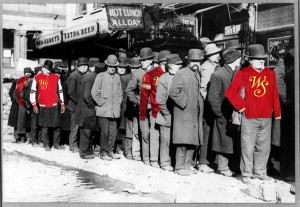People have long said Wye Sprite University’s great weakness is its location. The university is highly ranked across all its academic programs, especially in science and medicine, but the city of Duncastle that surrounds it has been economically depressed—with low graduation and high crime rates—since the meat packing and rivet industries moved out in the 1960s.
However, what used to be seen as a weakness may have just turned into the university’s greatest strength. University administrators recently announced that the school had struck an agreement with the City Council and the mayor whereby Wye Sprite will assume all outstanding city debt and commit to a future $100 million annual donative in return for the right to set the city’s regulations and policies in a number of areas.
The deal is believed to be the first of its kind and will pull the city out of potential receivership or bankruptcy after years of mismanagement while at the same time enabling the university to open new areas of inquiry in the social sciences.
“The great limitation in the social sciences has been that we can’t run experiments like in medicine,” said University President Creath Wibuket, a former professor of economics. “Does a higher minimum wage help or hurt workers and firms? We argue back and forth but no one knows for sure. Now we can do randomized trials by varying the minimum wage block by block, say, and measuring the effect over years. This makes us the greatest place in the world to study society.”
The Department of Economics will manage the city and have full control over variables such as zoning, taxes, employment law, and education policy. The economics faculty is already designing experiments to look at questions such as the effect of tax rates on productivity and the effectiveness of safety laws as compared to industry self-regulation.
Professor Tom Jones will lead one of the first experiments—a close look at employment laws. “We will exempt companies from child-labor limitations and measure the effects,” Jones says. Manufacturing businesses throughout the city will be randomly assigned to one of three regimes: current law, a lowered minimum age of 12, or a lowered minimum age of 8. “Theory says that employers should want to retain workers, and so accident and fatality rates shouldn’t go up much. We will see.”
Jones says the entire department is energized by the new opportunity and is already generating ideas that are likely to greatly affect the future of the field. “One of my colleagues is working on a plan to offer tax rebates to high-income residents that will offset the effects of federal marginal tax rates, and we will measure the effects on productivity. You can’t do that anywhere else. Another is going to make the city’s best parks fee-based to see if this improves the quality of life for people using the park.”
The psychology department is developing a questionnaire and follow-up examination that they believe will uncover connections between personality factors and various life outcomes. They believe it will be the most comprehensive of its kind. The monthly, six-hour process will be mandatory for all Duncastle residents (though Wye Sprite employees and faculty are excluded in order to avoid conflict of interest).
Another experiment will cut high school and grade school teacher salaries by 50% to determine if this actually affects the quality of education. “Our hypothesis is that the best teachers do it for love, not money, so municipalities can save a lot of money without losing much in terms of quality,” says project lead Eliza Lint, another professor of economics. She points out that a democratic government would never be able to make this kind of bold experiment due to fear of being seen as disadvantaging some citizens. “Sure some experiments won’t work out,” she says. “But with a leading university in charge, I’m sure people will be better off–at least the median person will be.”
“Quite frankly, these people have held us back for a long time,” continues Lint, referring to how the poor reputation of Duncastle affects Wye Sprite’s rankings. “They may not believe in education themselves. They can drop out of high school and sit on their stoops all day, but they’ll still be doing something to advance a great university. I think there’s a poetic justice in that.”
The buzz in academic circles is that, by virtue of this coup, Wye Sprite will now attract the top talent in social sciences. “Would you want to go somewhere else and work with models and old data sets, or get to test your ideas on people’s real lives, in real time?” said one recent economics PhD who asked to remain anonymous because she was applying for a job at WSU. “It’s a classic disruptive innovation. Every other university will have to do something to keep up.”
“The city is now our petri dish,” says Wye Sprite President Wibuket. “One giant petri dish, and we’ll swab all sorts of exciting things on it.”
More on economics, finance, and society:
– Protests Erupt over the Lone Banker Convicted for a Role in the Financial Crisis
– Wealthy Individuals Offer “Benign Interceptions” of Lottery Winnings to Aid Middle Class and Poor


